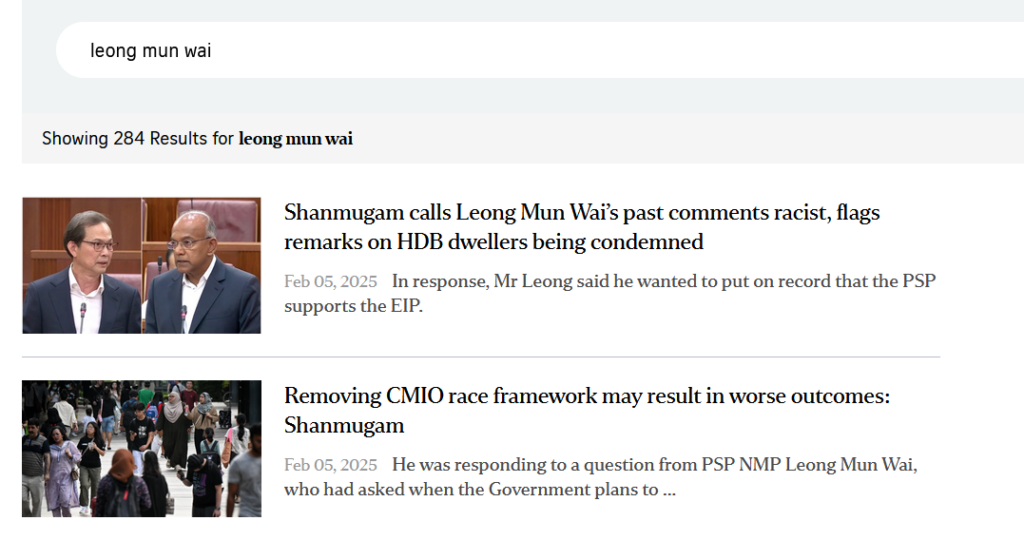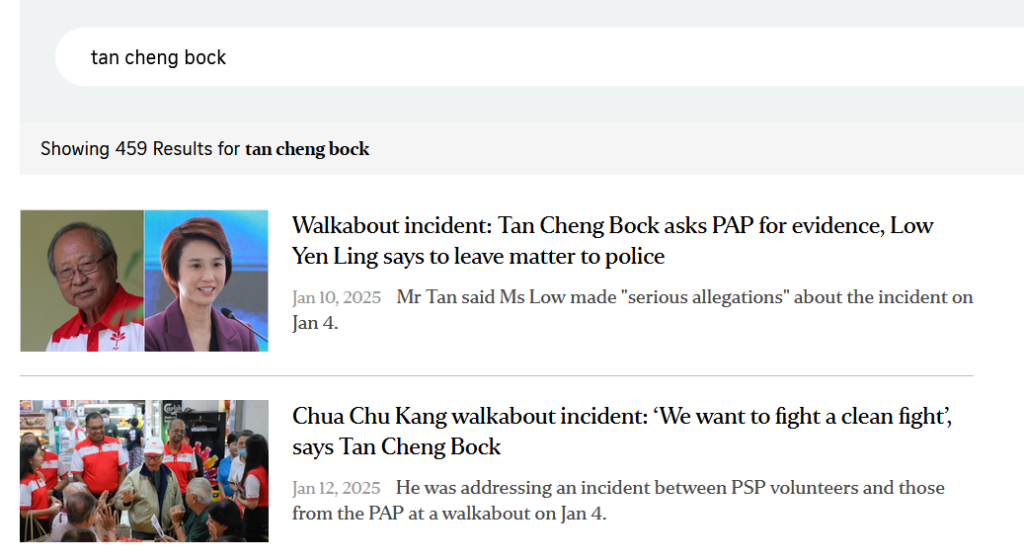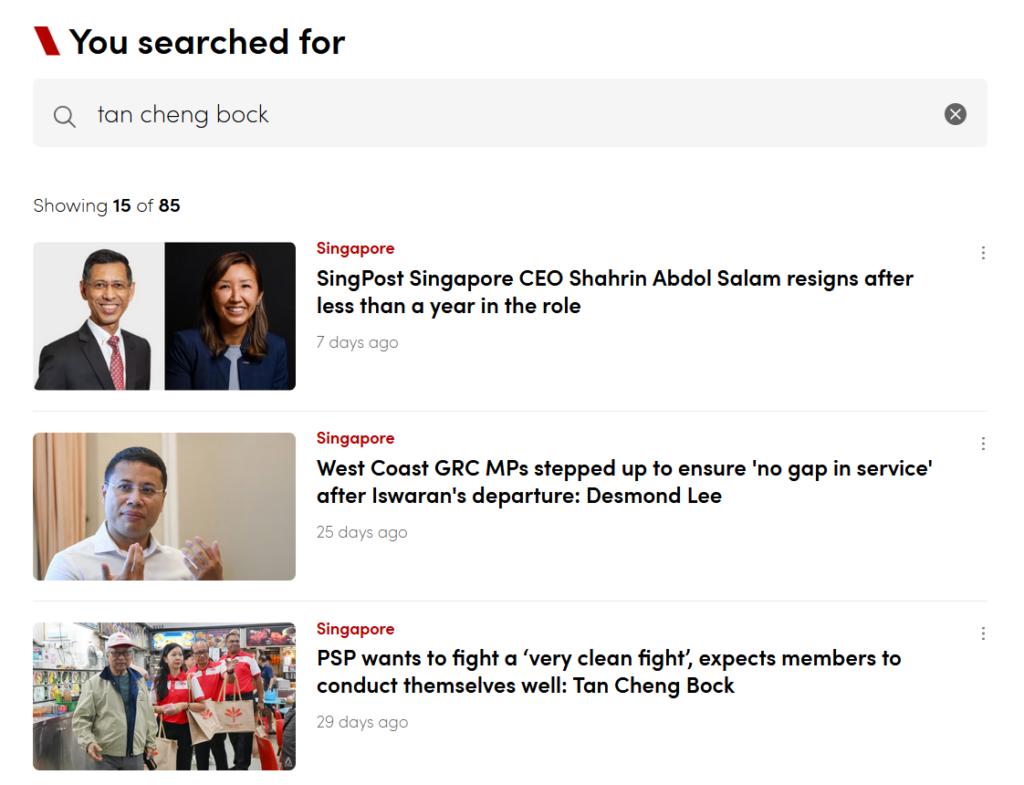The Online Citizen (TOC) highlights concerns over the mainstream media’s apparent silence on key rebuttals by opposition leaders Leong Mun Wai and Dr Tan Cheng Bock in response to Minister for Home Affairs and Law K Shanmugam’s recent accusations of racism.
Despite both leaders addressing the issue on Facebook, state-backed outlets such as The Straits Times and Channel NewsAsia (CNA) have provided little to no coverage, raising questions about whether selective reporting is at play.
On 8 February, Dr Tan, Chairman of the Progress Singapore Party (PSP), published a Facebook post titled “Multi-racialism, National issues and Mature politics” to defend PSP’s position on multiracialism and address allegations against NCMP Leong Mun Wai.
The statement came after Shanmugam accused Leong of making racially charged remarks during a parliamentary debate on 5 February.
Dr Tan argued that the Minister’s comments misrepresented the PSP’s stance and risked stirring racial sensitivities.
He outlined PSP’s commitment to multiracialism, pointing to its diverse leadership and candidate selections during the 2020 General Election, which included individuals of Chinese, Malay, Indian, and even Caucasian backgrounds.
“PSP is a party where all races have a voice,” he stated, reaffirming the party’s dedication to representing Singapore’s multiracial society.
However, despite the significance of Dr Tan’s rebuttal, The Straits Times—funded through a S$900 million grant under SPH Media Trust—did not report on his statement or Leong Mun Wai’s earlier Facebook response on 6 February. As for SPH’s Chinese paper, Lianhe Zaobao, it reported on Dr Tan’s comment but skipped Leong’s Facebook response.


CNA, which is owned by Temasek Holdings, reported on Leong’s initial Facebook post but omitted any mention of Dr Tan’s clarification. Given that state-backed media outlets have shown a history of quickly reporting on social media posts by opposition figures, this lack of coverage is notable.

Dr Tan’s post also defended PSP’s decision to tackle sensitive topics such as the Singapore-India Comprehensive Economic Cooperation Agreement (CECA) and the Chinese-Malay-Indian-Others (CMIO) framework.
While acknowledging that these issues may have racial undertones, he stressed that PSP’s concerns were focused on the well-being and job security of Singaporeans, not racial animosity.
Leong similarly defended his statements in his Facebook post, clarifying that his critiques of CECA were based on its impact on local jobs and livelihoods, not racial discrimination.
He warned that labelling individuals as racist for raising difficult socio-economic issues could suppress necessary public debate.
Dr Tan further criticised the unfair portrayal of PSP as a party that promotes racism, drawing a comparison to an instance involving the People’s Action Party (PAP).
He referred to a situation where a minority Member of Parliament vacated her seat mid-term—likely referencing Mdm Halimah Yacob’s resignation to contest the 2017 presidential election for minorities.
“Would it be fair to say that the PAP cares little for minority representation? One may be tempted to infer so, but mature politics will suggest otherwise,” he remarked, calling for a higher standard of political dialogue.
From TOC’s perspective, it is hard to believe that mainstream media outlets were unaware of these statements, given their importance and the fact that the outlets often swiftly report on opposition leaders’ social media posts when they align with the government’s narrative.
The selective nature of this coverage—or lack thereof—raises concerns about the media’s role in ensuring balanced reporting on significant political discussions.
Singapore’s media landscape is dominated by state-linked organisations, with The Straits Times and CNA being two of the most prominent examples.
The state’s financial support and ownership structures have long been defended as necessary for maintaining social stability, but they also lead to frequent accusations of editorial bias and self-censorship. When important rebuttals on sensitive issues, such as race and national policy, are ignored, it deprives the public of access to diverse perspectives and informed debate—particularly during the General Election.
TOC highlights that selective reporting risks undermining Singapore’s multiracial foundation and democratic principles.
When opposition voices are excluded from mainstream media narratives, it creates an uneven playing field in public discourse, potentially skewing public perception in favour of the ruling party.
Dr Tan’s call for “mature political dialogue” is more urgent than ever. “We urge political leaders to avoid making sweeping accusations, particularly on sensitive racial matters,” he wrote, stressing the need for responsible and constructive discussions.
As opposition leaders increasingly rely on alternative platforms like Facebook to communicate with the public, TOC emphasises the responsibility of mainstream media to cover all perspectives fairly.
Without balanced coverage, public trust in the media will continue to erode, leaving Singaporeans to question whether their media truly represents the diverse voices of the nation.


